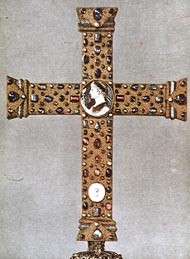
|
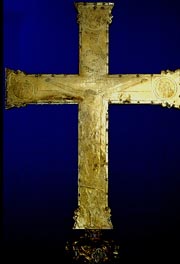
|

|

|
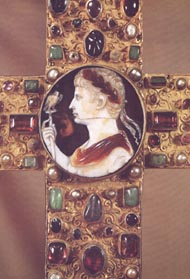
What follows is a translation of an Old English poem, perhaps dating from the end of the eighth century and associated with the poet named Cynewulf. We know four poems directly signed by Cynewulf, but we know nothing else about him. He could perhaps be the Cynewulf who retired as Bishop of Lindisfarne in 779 or 780. The Dream of the Rood is not signed by Cynewulf, but modern scholars have pointed to the similarities in the signed poems of Cynewulf.

Fragments of the poem carved in runic letters have been identified on the so-called Ruthwell Cross, dating from the seventh century. The poem and cross are possibly based on a common source. The Cross can be seen as a trophy or standard of victory commemorating Christ's triumph. Relate this to the imagery we encountered in the Post-Constantinian representations of Christ, specifically the reference to the cross in the St. Chrysostom passage and in the excerpt from the Prudentius poem.
Read this poem as a meditation on a liturgical cross like the Cross of Lothair illustrated above or the Golden Crucifix described by Abbot Suger of St. Denis and illustrated in the painting by the Master of St. Gilles. Pay attention to the imagery of the poem. See how the Dreamer is understood as an exile lost in darkness. As such he can be related to the Christian as a homo viator or a wanderer lost in exile and seeing this life as a wandering to the Christian's true home. Through meditation on liturgical objects like the Crosses, the Dreamer is led from the material to the spiritual. In the text of the poem note the identification between the Cross and Christ. At first they are separate but at the Crucifixion they become one. It is through meditation on the Cross that the Dreamer moves through a spiritual wandering to a mystical union with heaven. It is through the cross that the Christian achieves salvation: "Per crucem ad lucem."
Lo! I will tell the dearest of dreams
That I dreamed in the midnight when mortal men
were slunk in slumber. Me-seemed I saw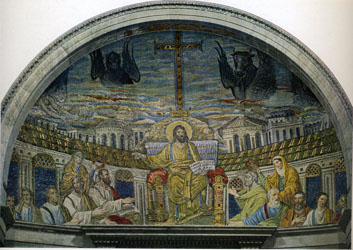
A wondrous Tree towering in air,
Most shining of crosses compassed with light. -5
Brightly that beacon was gilded with gold;
Jewels adorned it fair at the foot,
Five on the should-beam, blazing in splendor.
Through all creation the angels of God
Beheld it shining - no cross of shame! -10
Holy spirits gazed on its gleaming,
Men upon earth and all this creation.
Wondrous that Tree, that Token of triumph,
And I a transgressor soiled with my sins!
I gazed on the Rood arrayed in glory, -15
Shining in beauty and gilded with gold,
The Cross of the Saviour beset with gems.
But through the gold-work out gleamed a token
Of the ancient evil of sinful men
Where the Rood on its right side once sweat blood. -20
Saddened and rueful, smitten with terror
At the wondrous vision, I saw the Cross
Swiftly varying vesture and hue,
Now wet and stained with the Blood outwelling,
Now fairly jewelled with gold and gems. -25
Then, as I lay there, long I gazed
In rue and sadness on my Saviour's Tree,
Of all woods worthiest, speaking these words:
'Long years ago (well yet I remember) -30
They hewed me down on the edge of the holt,
Severed my trunk; strong foemen took me,
For a spectacle wrought me, a gallows for rogues.
High on their shoulders they bore me to hilltop,
Fastened me firmly, an army of foes! -35
'Then I saw the King of all mankind
In brave mood hastening to mount upon me.
Refuse I dared not, nor bow nor break,
Though I felt earth's confines shudder in fear;
All foes I might fell, yet still I stood fast. -40
'Then the young Warrior, God, the All-Wielder,
Put off his raiment, steadfast and strong;
With lordly mood in the sight of many
He mounted the Cross to redeem mankind.
When the hero clasped me I trembled in terror, -45
But I dared not bow me nor bend to earth;
I must need stand fast. Upraised as the Rood
I held the High King, the Lord of Heaven.
I dared not bow! with black nails driven
Those sinners pierced me; the prints are clear, -50
The open wounds. I dared injure none.
They mocked us both. I was wet with blood
From the Hero's side when He sent forth His spirit.
'Many a bale I bore on that hill-side
Seeing the Lord in agony outstretched. -55
Black darkness covered with clouds God's body,
That radiant splendor. Shadow went forth
Wan under heaven; all creation wept
Bewailing the King's death. Christ was on the Cross.
'Then many came quickly, faring from far, -60
Hurrying to the Prince. I beheld it all.
Sorely smitten with sorrow in meekness I bowed
To the hands of men. From His heavy and bitter pain
They lifted Almighty God. Those warriors left me
Standing bespattered with blood; I was wounded with spears. -65
Limb-weary they laid me down, they stood at His head,
Looked on the Lord of Heaven as he lay there at rest
From His bitter ordeal all forspent. In sight of His slayers
They made Him a sepulchre carved from the shining stone;
Therein laid the Lord of triumph. At evening tide -70
Sadly they sang their dirges and wearily turned away
From their Lordly Prince; there He lay all still and alone.
'There at our station a long time we stood
Sorrowfully weeping after the wailing of men
Had died away. The corpse grew cold, -75
The fair life-dwelling. Down to earth
Men hacked and felled us, a grievous fate!
They dug a pit and buried us deep.
But there God's friends and followers found me
And graced me with treasure of silver and gold. -80
'Now may you learn, O man beloved,
The bitter sorrows that I have borne,
The work of caitiffs. But the time is come
That men upon earth and through all creation
Show me honour and bow to this sign. -85
On me a while God's Son once suffered;
Now I tower under heaven in glory attired
With healing for all that hold me in awe.
Of old I was once the most woeful of tortures,
Most hateful to all men, till I opened for them -90
The True Way of Life. Lo! the Lord of glory,
The warden of heaven, above all wood
Has glorified me as Almighty God
Has honored His Mother, even Mary herself,
Over all womankind in the eyes of men. -95
'Now I give you bidding, O man beloved,
Reveal this Vision to the sons of men,
And clearly tell of the Tree of glory
Whereon God suffered for man's many sins
And the evil that Adam once wrought of old. -100
'Death He suffered, but our Saviour rose
By virtue of His great might as a help to men.
He ascended to heaven. But hither again
He shall come unto earth to seek mankind,
The Lord Himself on the Say of Doom, -105
Almighty God with His angel hosts.
And then will He judge, Who has power of judgment,
To each man according as here on earth
In this fleeting life he shall win reward.
'Nor there may any be free from fear -110
hearing the words which the Wielder shall utter.
He shall ask before many: Where is the man
Who would taste bitter death as He did on the Tree?
And all shall be fearful and few shall know
What to say unto Christ. But none at His coming -115
Shall need to fear if he bears in his breast
This best of symbols; and every soul
From the ways of earth through the Cross shall come
To heavenly glory, who would dwell with God."
Then with ardent spirit and earnest zeal, -120
Companionless, lonely, I prayed to the Cross.
My soul was fain of death. I had endured
Many an hour of longing. It is my life's hope
That I may turn to this Token of Triumph,
I above all men, and revere it well. -125
This is my heart's desire, and all my hope
Waits on the Cross. In this world now
I have few powerful friends; they have fared hence
Away from these earthly gauds seeking the King of glory,
Dwelling now with the High Father in heaven above, -130
Abiding in rapture. Each day I dream
Of the hour when the Cross of my Lord, whereof here on earth
I once had vision, from this fleeting life may fetch me
And bring me where is great gladness and heavenly bliss,
Where the people of God are planted and stablished for ever -135
In joy everlasting. There may it lodge me
Where I may abide in glory knowing bliss with the saints.
May the Lord befriend me who on earth of old
Once suffered on the Cross for the sins of men.
He redeemed us, endowed us with life and a heavenly home. -140
Therein was hope renewed with blessing and bliss
For those who endured the burning. In that great deed
God's Son was triumphant, possessing power and strength!
Almighty, Sole-Ruling He came to the kingdom of God
Bringing a host of souls to angelic bliss, -145
To join the saints who abode in the splendour of glory,
When the Lord, Almighty God, came again to His throne.
Trans. by Charles W. Kennedy
The two sides of the Cross of Lothair can be compared to the regular pairing of Christ in Majesty with Christ on the Cross in Carolingian art. The two pages from the so-called Metz Sacramentary illustrated below were made at the Court School of Charles the Bald about 870. Compare and contrast the images of Christ on the Cross on the Lothair Cross and in the Metz Sacramentary:
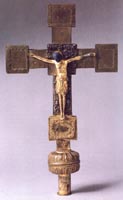
|
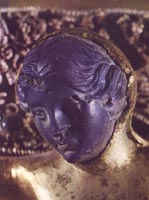
|
The bronze crucifix above was made for Archbishop Herimann of Cologne c. 1050. The style of the body clearly conforms to the linear style of German art of the period. But like the Lothair Cross illustrated above, the head of Christ presents a dramatic contrast. This head can be identified as Empress Livia, the wife of Augustus Caesar, and thus dates from the end of the 1st century B.C. or the beginning of the 1st century A.D. The imperial connotations would not have been lost on Herimann who was the grandson of the Holy Roman Emperor Otto III. The value of this head is not just in who it represents, but in its material: lapis lazuli. The intense blue of this stone made it especially valued. The only source of this stone during the Middle Ages was a mine in modern day Afghanistan.
Theophilus, Diversarum Artium Schedula, preface to Book III:
The most renowned of the Prophets, David
--of whom the Lord had prescience, and whom he predestined before
mundane ages, and whom, on account of the simplicity and humility
of his mind, He elected, after his own heart, and placed over
the people of his choice, and established with his Holy Spirit,
that he might nobly and wisely regulate the conduct appertaining
to so great a name -- concentrating within himself all the power
of his soul in the love of his Maker, uttered these words amongst
others: 'Lord, I have loved the beauty of thy house,' And although
it was lawful that a man of so much authority and of such capacious
intellect should call house the habitation of heavenly worship
in which God presides in ineffable brightness over the hymns of
choirs of angels, towards which he himself yearned with all his
soul, saying, 'One thing have I desired of the Lord, that will
I seek after; that I may dwell in the house of the Lord all the
days of my life;' or, as the refuge of a devoted breast and most
pure heart, in which God truly dwelt, of which asylum an intense
desire again prays forth, 'Renew a right spirit within me, O Lord'
--yet it is certain that he strongly desired the embellishment
of the material house of God, which is the place of prayer.
For almost all the treasures in gold, silver, brass, and iron
of the house, whose founder he himself with such an ardent desire
coveted to be made, yet of which he was not worthy, on account
of the frequent effusion of human, although hostile, blood, he
committed to his son Solomon. For he had read in Exodus that God
had given command to Moses for the construction of the tabernacle,
and had selected by name the masters of the works, and that he
had filled them with the spirit of wisdom and intelligence and
science, in every knowledge, for inventing and executing work
in gold and silver, and brass, gems, wood, and in art of all kinds;
and he had discerned by means of pious reflection, that God complacently
beheld decoration of this kind, which He was appointing to be
constructed under the teaching and authority of His Holy Spirit;
and he believed that without his inspiration no one could mould
any work of this kind. Therefore, most beloved son, you will not
doubt, but believe with an entire faith, that the Spirit of God
has filled your heart when you have adorned his temple with so
much beauty, and with such variety of work; and that you may not
chance to fear, I can prove, with clear reasoning, that whatsoever
you may be able to learn, understand, or invent in the arts, is
ministered to you as a gift of the sevenfold Spirit.
Through the spirit of wisdom you know that all created things
proceed from God, and that without Him nothing exists. Through
the spirit of intelligence you have acquired the faculty of genius,
in whatever order, in what variety, in what proportion, you may
choose to apply to your varied work. Through the spirit of counsel
you do not hide the talent conceded to you faithfully expound
to those desirous to learn. Through the spirit perserverance you
shake off all lethargy of sloth, and whatever diligence you commence,
you carry through with full vigor to the completion. Through the
spirit of science accorded to you, you rule with genius from an
abounding heart, and from that with which you entirely overflow
you bestow with the confidence of a well-stored mind for the common
good. Through the spirit of piety you regulate the nature, the
destination, the pious consideration, the price of the fee, that
the vice of avarice or covetousness may not steal in. Through
the spirit of the fear of God you meditate that you can do nothing
from yourself, but you consider that you possess, or will, nothing
unconceded by God; but by believing, confiding and giving thanks,
you ascribe to divine compassion whatever you have learned, or
what you are, or what you may be.
Animated, dearest son, by these covenants with the virtues, you
have confidently approached the house of God, have decorated with
the utmost beauty ceilings or walls with various work, and, showing
forth with different colors a likeness of the paradise of God,
glowing with various flowers, and verdant with herbs and leaves,
and cherishing the lives of the saints with crowns of various
merit, you have, after a fashion, shown to beholders everything
in creation praising God, its Creator, and have caused them to
proclaim him admirable in all his works. Nor is the eye of man
even able to decide upon which work it may first fix its glance;
if it beholds the ceilings, they glow like draperies; if it regards
the walls, there is the appearance of paradise; if it marks the
abundance of light from the windows, it admires the inestimable
beauty of the glass and the variety of the most costly work. But
if perchance a faithful mind should behold a representation of
our Lord's passion expressed in drawing, it is penetrated with
compunction; if it beholds how many rewards of eternal life they
have received, it quickly induces the observance of a better life;
if it regards how much rejoicing how much rejoicing is in heaven,
and how much suffering in the flames of hell, it is animated by
hope for its good actions, and is struck with fear by the consideration
of its sins.